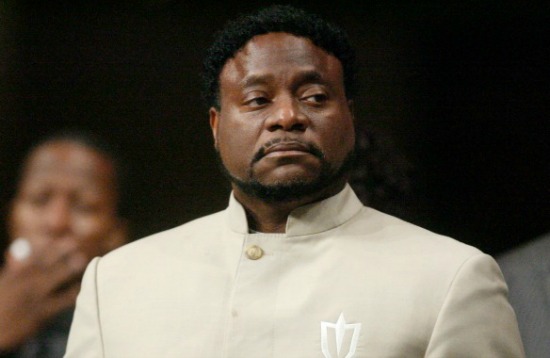
(AP Photo/John Amis)
The evangelical world lost a controversial megastar last month. During the two decades of the 1990s and 2000s, few megachurch pastors were as influential as Bishop Eddie Long. His international television ministry made him religious royalty among religious broadcasters. His 20,000-plus member megachurch provided him with influence among the celebrity and political classes.
Yet his following has diminished in recent years. In 2010 four young men accused Long of lavishing them with expensive gifts, tuition assistance, and automobiles in order to coax them into sexual relationships. Bishop Long was a complicated personality in life, and now in death.
Eddie Long’s rise to fame could be attributed, in part, to his theological machismo and financial bravado. He built an influential ministry by reframing the traditional optics of American evangelical piety. Long challenged a view of the church that equated religious worship with female emotion.
Along with other popular Christian men’s groups that emerged in the 1990s like the Promise Keepers, Long provided an alternative view of the faith for African American men who felt otherwise disaffected from “effeminate” churches. As NFL Hall of Famer Deion Sanders declared at the Bishop’s funeral, “This was a man’s man.”
One might even argue that Long offered himself as the masculine prototype. He coupled the “warrior” spirit of Sampson with the financial largess of King Solomon. Though Bishop Long was not affiliated with preachers of the Word of Faith movement like Creflo Dollar and Kenneth Hagin who promote a “health and wealth” theology, he embraced all of the markers of the prosperity gospel.
From the conspicuous sword that adorned the church’s logo to his $300,000 automobile in the church parking lot, he unapologetically touted money and power. Add to this his customary tight shirts over a muscular build, and the bishop’s vision of God was apparent without ever having to preach a sermon. He was his own hypermasculine, conspicuous consuming theology in the flesh.
What is more, Bishop Long used his physical location in suburban Atlanta to appropriate the narrative of the Civil Rights movement in general, and the Rev. Martin Luther King Jr. in particular. The Bishop saw himself as Joshua to King’s Moses. He seized the proverbial Promised Land. And as a “conqueror,” it became his responsibility to ensure that others did not lay claim to the struggle, namely members of the LGBTQ community.
This is why the later charges and subsequent financial settlement involving sexual relations with those young men caused so many jaws to drop. Up to this point, his message had been unequivocal regarding black manly uplift. If middle-class African Americans were the new Children of Israel, gays and lesbians were the evil Canaanites.
At one point, the bishop and Bernice King, to the chagrin of her mother Coretta Scott King, used the King Center for Nonviolent Social Change as the backdrop for an anti-marriage-equality rally. Long played to a popular yet puerile political polarity. In Long’s vision, for African American progress to remain secure, LGBTQ progress in terms of equal rights had to be defeated. Little thought was given to the ways this view dehumanized African American gays and lesbians who are vital to African American social progress.
Unfortunately, the Bishop’s regressive views about sin and sexuality seemed to have come back around on him at the end of his life. Ever since images of a gaunt and frail-framed Eddie Long began to circulate around the Internet in the fall, one question has dominated social media: “Does the Bishop have AIDS?”
This question reveals more about the view of AIDS in the African American community than any disease that ended the Bishop’s life. (In a statement about his death, his church said he died from “an aggressive form of cancer.”) It is a homophobic-laced query rooted in vengeful views of the disease.
For many, AIDS is the logical outcome for the bishop since he evidently possessed same-sex desire. For others who view Long as guilty of sexually abusing those boys, his dying of AIDS would be some sort of poetic justice.
Both examples reflect the damaging effects of 30 years of terrible theology in our churches. The view that AIDS is a result of, or punishment for, same-sex activity is as wrong as it is irresponsible.
African Americans suffer from the highest HIV infection rate in the United States. According to the Centers of Disease Control, stigma, fear, homophobia, and structural poverty both discourage testing and frustrate prevention and treatment efforts. If the most viable institution among African Americans is also a major progenitor of the stigma and fear associated with AIDS, then we are fighting an uphill battle. Black churches must do better. Black churches must know better.
Despite the church’s statement, none of us may ever truly know what ended Bishop Long’s life. Frankly, it’s none of our business. I do know this to be true, however: Too many people are dying from AIDS-related complications in the African American community. This is unfortunate and unnecessary. For it is not the disease that is killing us, per se. We are dying from regressive, hateful, views of God. And this, more than anything else, is the Bishop’s legacy, with all its complications.
Bishop Eddie Long didn’t seize King’s envisioned Promised Land. To the contrary, he helped foster a homophobic valley of dry bones. This is what makes his death even more sad and tragic. His body became the target of the same kind of ignorance and hate which the Bishop helped to produce.
Jonathan L. Walton is the Plummer Professor of Christian Morals at Harvard University.